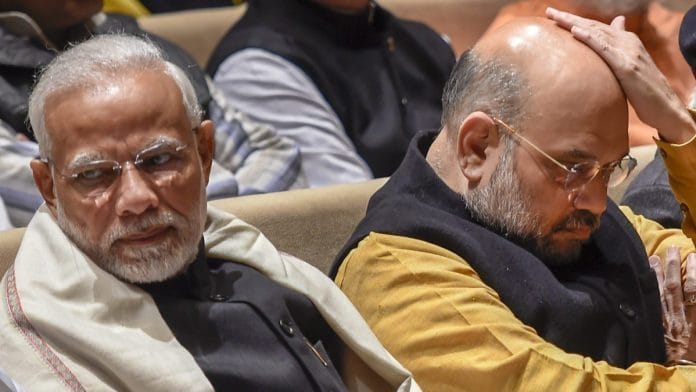New Delhi: The National Democratic Alliance (NDA) looks comfortably set for a second term in office, with another ‘Modi wave’ drowning the opposition parties again, but the prime minister may have reasons to be anxious.
The Balakot air strikes against Pakistan to ‘avenge’ the Pulwama terror attack helped the Modi government to paper over its failures on the economic front — adverse impact of demonetisation, joblessness, sluggish exports and manufacturing, lack of private investment and farm distress, among others.
But these issues are set to trouble Modi in his second term, which will test his administrative and political acumen more than it ever did during the 18 years he has been in power in Ahmedabad and Delhi.
That’s why if Modi 1.0 was all about bluster and bombast, with politics dictating governance, Modi 2.0 could be just the other way around — circumspect, measured and delivery-oriented.
To get the latest live updates on the Lok Sabha elections, click here
The 2019 Lok Sabha election results have one message written all over: That voters want to be led by a strong leader and they are fed up with identity politics.
The opposition parties played into Modi’s hands by playing on his strength and singling him out for attack, making it a Modi versus the rest personality contest.
The Congress party’s promises to review the Armed Forces Special Powers Act (AFSPA) and sedition laws only helped the BJP to raise the nationalist pitch. Worse, there were few takers for Rahul Gandhi’s doles such as NYAY or the minimum guaranteed income of Rs 6,000 per month.
The opposition parties were found clueless about what weighed on people’s minds as they kept harping on the alleged Rafale scam, something nobody seemed to bother about on the ground.
Also read: Pulwama-Balakot helps Modi in polls — issues of farmers, jobs, Rafale don’t exist anymore
Midway through his first term, Modi had shifted the goalpost, promising a ‘New India’ in 2022, when farmers’ income would be doubled, every Indian would have a house and amenities and everyone’s aspirations would be fulfilled.
Now that people have given Modi a renewed mandate to fulfil all these promises on the 75th anniversary of the country’s Independence, he has an unenviable task at hand.
In carrying out this responsibility, however, the prime minister is likely to face a lot of hurdles, most of his own creation. In its 2019 manifesto, the BJP has promised to repeal Article 35A, which gives special rights to Jammu & Kashmir’s permanent residents, and Article 370.
Besides, the Supreme Court is seized with the contentious Ayodhya Ram temple issue and a verdict is expected during Modi’s second term. These are all politically sensitive issues and the prime minister will be confronted with all of them at a time when he will be required to focus on the economy.
How he deals with these challenges would define not just his second term but also his legacy.
Also read: No Ram tourism, jobs or development — Ayodhya is still waiting for BJP to fulfill promises







1.I think Mr.MODIJI must implement his 3 major reforms said in his OCTOBER 2014 speech.{a}Village adoption {b}Khadi development and {c}Skill development
Village Adoption: Hon.Prime Minister should as k his MPs to adopt atleast One village in their constituency .He can ask Nationalised Banks to help MPs to prepare Project Reports,implement the project,co-ordinate the liaison between Govt,revenue officials,Panchayat and villagers to review the progress.An MP will be getting Rs25 crores during his tenure and that will be sufficient to meet major expenses for starting Primary schools,Primary heath centers,markets to collect and sell farm products and also to transport to nearest towns to get better price. Additional funding from Govt will ensure successful implementation of the scheme. When Hon.P.M reviewed the progress in 2015 or 2016 he found Most of the Mps did not adopt villages.No leniency should be shown now.
2.Khadi Development:All over the world people prefer cotton dress and fabrics. Foreign markets are filled with Chinese,Indonesian and Bangla desh goods.Govt must conduct an expert study to compete with them in exports .Our products should be made competitive either by improving productivity and/or by providing subsidy.. Khadi development if encouraged as a cottage industry will provide job to rural labourers during off season and will help to improve their income. Apart from increasing Cotton cultivation it will also help to increase INDIRECT employment and income generation.I had read a detailed article written by a Professor of Bangalore University about the tremendous scope for increasing Rural Income and earning Foreign Exchange through Khadi Development.
3.Skill Development: Thousands of Skilled technicians come out of our ITIs every year .They should get jobs .If Govt directly or through NGOs and Industrialists develop industrial Parks ,start units for manufacture of products required by defense,Railways,Tele -Communications etc we will be able to save foreign Exchange and also provide employment for youngsters.It is easy to make products if you have good machines and working capital.But selling is beyond the control of manufacturer.It is here they need support from Govt.
If Govt entrust these portfolios to a sincere,energetic Minister they will be able to change the face of Rural India in 2-3 years.
May this exceptional renewal of the mandate be turned into stellar performance. Indians want Acche Din above all else.